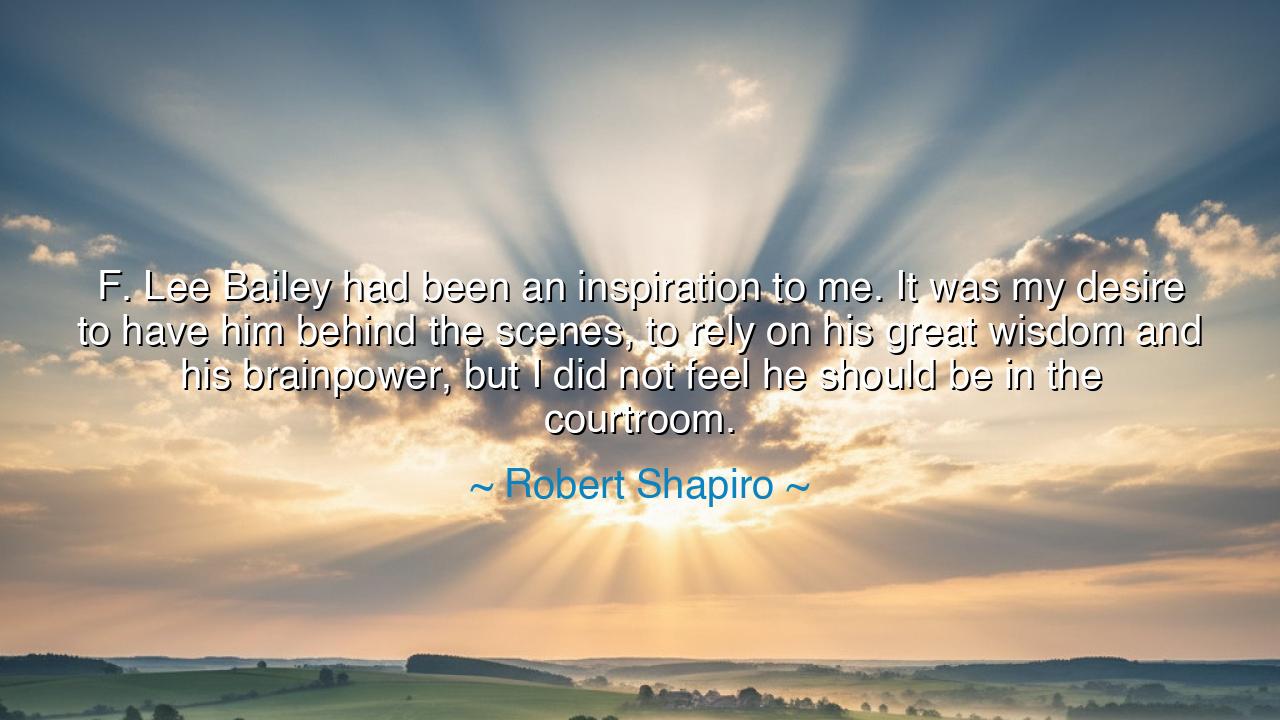
F. Lee Bailey had been an inspiration to me. It was my desire to
F. Lee Bailey had been an inspiration to me. It was my desire to have him behind the scenes, to rely on his great wisdom and his brainpower, but I did not feel he should be in the courtroom.






Robert Shapiro, speaking as one seasoned in the battles of the law, reflects with reverence when he says: “F. Lee Bailey had been an inspiration to me. It was my desire to have him behind the scenes, to rely on his great wisdom and his brainpower, but I did not feel he should be in the courtroom.” In this confession lies a profound lesson: that the gifts of wisdom and intellect are not always displayed upon the stage, but may serve most powerfully in the shadows, guiding from behind rather than shining at the center.
The ancients themselves knew the distinction between visible glory and hidden counsel. In the courts of kings, the advisor was often as vital as the monarch. Odysseus, though not always the loudest voice among the Greeks, was the strategist whose cunning delivered Troy into their hands through the wooden horse. His power was not in commanding armies with pomp, but in shaping the course of events with his mind. So too did Shapiro recognize in Bailey not the man for the courtroom’s spotlight, but the mind to direct the strategy behind it.
History echoes this truth in the life of Cardinal Richelieu, the unseen hand behind the throne of France. While King Louis XIII bore the crown, it was Richelieu’s intellect and foresight that shaped the nation’s destiny. Though his name was not called in battle, his influence was decisive, teaching us that not all power resides in public triumph. Some of the greatest victories are born in silence, crafted by those who dwell behind the veil of visibility.
Shapiro’s words also reveal a deeper wisdom about the use of talent: that the wise leader knows not only how to wield strength, but how to place it where it is most effective. Brainpower and wisdom are treasures, but they must be set in their proper place, as a jewel is set in the right crown. The courtroom, with its theater and spectacle, was not Bailey’s stage in that moment, but his brilliance could still shape the outcome through unseen channels.
Let the generations remember: not all greatness is meant to be displayed. Some serve with honor in the light, others in the shadow, but both are essential to the work of destiny. The wisdom of a man may be hidden from the eyes of the crowd, yet still alter the course of history. Therefore, despise not the unseen counselor, for often it is his hand that guides the visible hero to victory.






VNkhanh val nguyen
I feel intrigued by Shapiro’s strategic reasoning. Is this decision an example of prioritizing overall success over personal accolades? I also wonder how Bailey felt about serving in an advisory capacity rather than being front and center. Could this illustrate the importance of humility and flexibility among highly skilled professionals? Additionally, does this approach offer lessons for mentoring, where guiding from behind the scenes might shape outcomes more effectively than direct involvement?
KVlu kien van
This perspective raises questions about the role of teamwork in high-pressure environments. Could relying on someone’s wisdom behind the scenes sometimes be more impactful than having them in a prominent role? I’m curious whether this choice was influenced by media scrutiny, courtroom strategy, or personal preference. How do leaders or team members decide who should lead visibly versus support from the sidelines, and what risks exist in placing great talent out of the spotlight?
LBLinh Bach
I find this statement thought-provoking because it highlights the distinction between intellect and presentation. How much of success in law—or any performance-driven profession—depends on visible charisma versus behind-the-scenes strategy? I also wonder about the interpersonal dynamics between Shapiro and Bailey. Did Shapiro consider Bailey’s ego or willingness to take a supporting role? This makes me think about leadership decisions where one must balance respect for talent with practical considerations of audience, optics, and outcome.
THNguyen thi thu huong
Reading this, I’m struck by the balance between admiration and practicality. Does Shapiro’s decision suggest that the courtroom requires a specific type of presence or style that even a brilliant lawyer might not fit? I’m curious how often professional mentors or inspirations are intentionally positioned in advisory roles to maximize effectiveness. Could this reveal the importance of recognizing strengths in different contexts, rather than assuming brilliance alone guarantees public success?
NTNhy Than
This quote makes me reflect on the dynamics of mentorship and strategic collaboration in high-stakes professions. How does one decide when a highly skilled individual should take a background role rather than a visible one? I wonder if Shapiro’s choice reflects confidence in his own abilities or a strategic assessment of public perception and courtroom presence. Could this approach of leveraging expertise behind the scenes be more effective in other fields, like business or politics, where visibility and optics matter as much as technical skill?